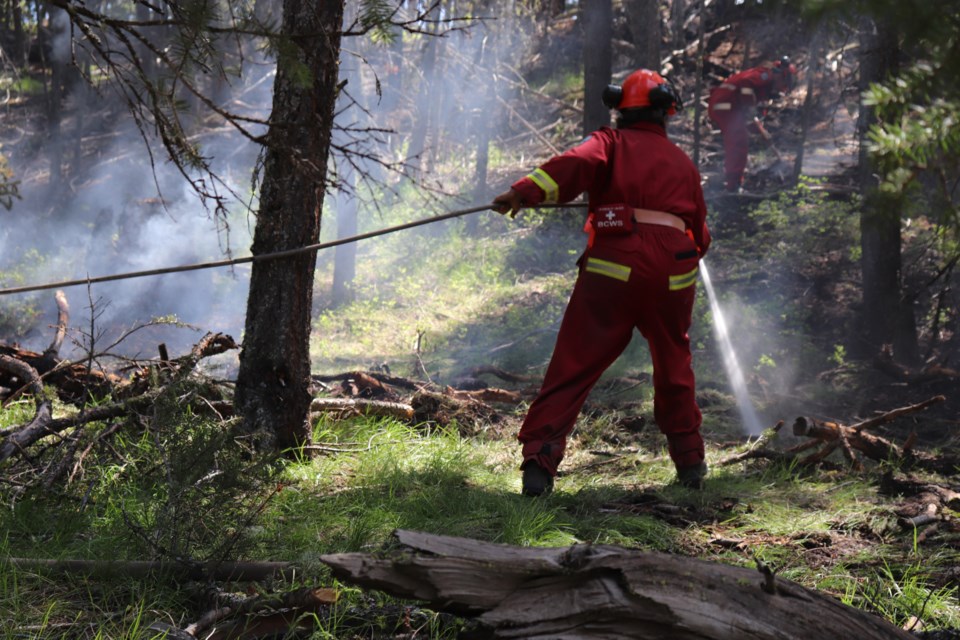The final batch of recruits made their way through boot camp last week, enduring hot temperatures, long days, and lots of physical work designed to give them a taste of what to expect in the upcoming fire season.
B.C. Wildfire Service hires 200 new recruits every year, chief fire information officer Kevin Skrepnek says, explaining they receive anywhere between 1,000 and 1,500 applicants any given year and noting the competitiveness within the hiring process.
Those who have made it into boot camp have already undergone a lot of rigour and they are the best of the best, Skrepnek adds.
This week, the final 60 recruits from across the province made their way to the Merritt Fire Zone and Provincial Training Centre, unsure of what to expect in the week ahead.
"There is a lot of anxious people that come in and we try not to give them too much [information] because we want a bit of an element of surprise because that is what our job is, but they quickly adapt to it just in time for us to change something else," Kyle Young, a trainer within the Merritt Fire Zone and Provincial Training Centre says.
"Every class that we teach are broken into strike teams right away," Young explains noting they will spend the remainder of the week working closely together and pushing each other through the hurdles of boot camp.
"We try to engage everyone and really promote the teamwork," Young says, explaining there is both classroom work exercises as well as fieldwork. "So they will go out and do pumps, and go out and do guard digging and that kind of thing. They are in the classroom learning it, and then they are demonstrating it in the field."
"The training they get here today is very much the foundational knowledge," Skrepnek says. "This is kind of the elementary skills they are going to need. It's definitely just the start of the process in terms of training, so from here this is kind of the basics. Once they get out on their crews it will just be the start in terms of the other things they will be learning, chainsaw work and stuff like that. There is definitely a lot of moving parts within the organization, so there is lots for them to learn after they leave here."
It is an amazing experience," Hanna Swift, the fire information officer stationed based in Merritt says, who is a third-year in the fire service and in 2017, she had been one of the recruits going through the training program.
Swift says there is a learning curve for any new recruits going into their first fire season.
"You can just picture, anyone who comes into this job doesn't have the slides like the public does," she explains regarding entering a wildfire scene. "You don't know what to expect you don't know what it looks like out there so it is definitely a learning curve in that sense, and really the first fire you go to, you're sort of shell shocked. The boot camp sort of prepares you but you can only set so many fake fires."
"I came in for the adventure and the physical and mental challenge, because you know its going to be a challenge, but I definitely stay for the people. The people that BC Wildfire ends up recruiting and the people who stick with it are amazing and just a huge range of backgrounds and experiences and that is what keeps people in the job I think."
"The training has been good," Guy Cullen, one of the 2019 recruits for B.C. Wildfire says. "Its been hard but the job is hard."
"You need to learn to work with a pace and have that pace carry on for 14-day tours," Cullen adds, noting "the training is tough but it is really valuable."
Cullen has three cousins who are wildland firefighters, and hearing their stories is what drew him to the job.
He has never worked within the fire industry but says his work as an arborist came in useful during his application process as he has experience working a chainsaw and other similar tasks.
Skrepnek says they have a number of things they look for when going through the applicant pool.
While firefighting, forestry and natural resources are assets, they are not necessarily the only thing that can land you one of the limit spaces.
Skrepnek notes things like experience in team sports, as well as physical and especially mental strength, are things they look closely at when considering who to hire.
Those who go through the boot camp can be working 12-hour days in hot temperatures and are in and out of the classroom.
The provincial training grounds try to mimic what the recruits will experience out in the field, right down to the tents they will be sleeping in, however, there is only so much that can be covered in the week.
Recruits are challenged both mentally and physically, engraving the importance of teamwork and communication while teaching the skills that will be needed to keep them safe in the upcoming months, Skrepnek says.
Once the eight-day camp has completed, the recruits won't have much time to relax.
During their final day of training on May 10, the recruits found out what crew they will be stationed at.
"These folks could end up on any of our crews right across from B.C.," Skrepnek says. "Right from Fort Nelson to the Island to the Kootenays. By next week they will be dispersed right across the province."



